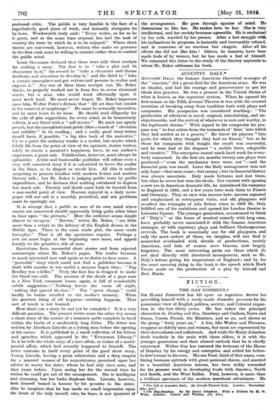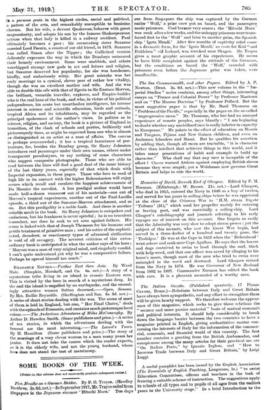FICTION.
THE GAY-DOMBEYS.t
Ste HARRY JOE/791+0N has hit upon an ingenious device for providing himself with a. ready-made dramatis personae for his panoramic view of English politics, society, and Colonial expan- sion in the last thirty years. He has taken the principal characters in Dombey and Son, Dombeys and Carkers, Toots and Susan, Cousin Feenix, the Blimbers, and so on, and shown us the group " forty years on." A few, like Walter and Florence, reappear as elderly men and women, but most are represented by their descendants and collaterals. And while Sir Harry Johnston deals tenderly in the main with these elders, it is with the younger generation and their altered outlook that he is chiefly concerned. Walter Gay has restored the fortunes of the House of Dombey by his energy and enterprise, and added his father- in-law's name to his own. His son Paul, third of that name, com- bining business aptitude with great personal charm, and married to a beautiful American heiress, has been richly rewarded for his pioneer work in developing trade with America, North and South, and the West Dulles. Paul, however, is more than a brilliant specimen of the modern merchant adventurer. He • The Lira of AsolOitin DON. By Joseph Francis Daly. London . Macmillan. isis. net.1 WeiGov-Dossbeye. By Sir liarry Johnston. With a Protium by H. e. Wells. London: Chatto and Vindus. Cht net.; in a persona grata in the highest circles, social and political, a patron of the arta, and remarkably susceptible to feminine charms. But his wife, a devout Quakeresa, behaves with great magnanimity, and adopts his son by the famous Shakespearean actress when that lady is killed in a railway accident. Paul ultimately becomes a peer : his coruscating sister Suzanne married Lord Feenix, a cousin of our old friend, in 1873. Suzanne was called. Susan after the Nipper ; the Gailicized version .1elicately expresses the way in which the Dontheys outsoared their homely environment. Some were snobbish, and others worshipped strange new gods in art and letters and religion, but Suzanne deserved bar popularity, for she was handsome, kindly, and audaciously witty. Her great mistake was her early marriage to a cynical, clever peer of rather low vitality, though she was an excellent mother and wife. And she was able to double this rile with that of Egeria to Sir Eustace Morven, the brilliant, versatile traveller, explorer, and Empire-builder who is the real hero of the book, and who, in virtue of his political independence, his acute but unorthodox intelligence, his intense interest in science and scientific education, birds and animals, tropical Africa and its inhabitants, may be regarded as the principal spokesman of the author's views. In politics as in science, religion, and society, the book is a picture of England in transition, of the clash of- schools and parties, brilliantly and. picturesquely done, as might be expected from one who is almost as distinguished as an artist as a man of affairs. The osiwae is penhaps overcrowded ; it has a tropical luxuriance of por- traiture, for, besides the Dombey group, Sir Harry Johnston introduces real personages under their owu names, others under transparent pseudonyms, to say nothing of some characters who suggest composite photographs. Those who are able to read between the lines will find a good deal of the inner history of the last thirty years, especially of that which deals with Imperial expansion, in these pages. Those who love to read of high life in its contact with the higher Bohemianism will enjoy scenes which recall and emulate the happiest achievements of Du Maurier the novelist, A less prodigal author would have made half-a-dozen romances out of his materials—one out of 7iforven's tropical experiences, another out of the Paul-Lucilla episode, a third out of the Suzanne-Morven attachment, and so on. But this prodigality is a noble fault. And there is another notable merit in the book. Sir Harry Johnston is outspoken and audacious, but his frankness is never spiteful ; he is no truculent iconoclast, nor does he seek to set sons against fathers. His name is linked with that of Joseph Thomson for his humane and gentle trestmented primitive man ; and his satire of the sophisti- cated, decadent, or reactionary types of advanced civilization is void of all savagery. The severest criticism of this extra- ordinary book-is anticipated in what the author says of his hero : " Morven vvarsa man of very original mind, and singularly candid. I can't quite understaud yet why he was a comparative failure. Perhaps he spread himself too much."



































 Previous page
Previous page